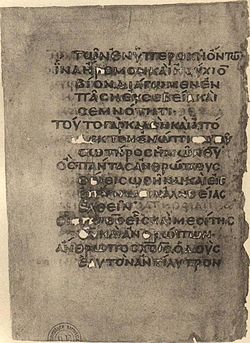1 Timothy 5
| 1 Timothy 5 | |
|---|---|
 Fragments showing 1 Timothy 2:2–6 on Codex Coislinianus, from ca. AD 550. | |
| Book | First Epistle to Timothy |
| Category | Pauline epistles |
| Christian Bible part | New Testament |
| Order in the Christian part | 15 |
1 Timothy 5 is the fifth chapter of the First Epistle to Timothy in the New Testament of the Christian Bible. The author has been traditionally identified as Paul the Apostle since as early as AD 180,[1][2][3] although most modern scholars consider the letter pseudepigraphical,[4] perhaps written as late as the first half of the second century AD.[5]
Text[]
The original text was written in Koine Greek. This chapter is divided into 25 verses.
Textual witnesses[]
Some early manuscripts containing the text of this chapter are:
- Codex Sinaiticus (AD 330–360)
- Codex Alexandrinus (400–440)
- Codex Ephraemi Rescriptus (c. 450; extant verses 1–19)
- Codex Freerianus (c. 450; extant verses 5–9, 16–19)
- Codex Claromontanus (c. 550)
Old Testament references[]
New Testament references[]
"Real Widows" and Other Widows (5:3–16)[]
Verse 16[]
- If any believing man or woman has widows, let them relieve them, and do not let the church be burdened, that it may relieve those who are really widows.[6]
- "If any believing man or woman has widows": that is, if any member of a church have mothers, grandmothers or any near relatives who are widows, and incapable of taking care of themselves.[7]
- "Let them relieve them and let not the church be charged": the members should take care of them out of their own substance; which is what Paul previously calls to show piety at home, and requit their own parents, so not burden the church with the maintenance of them.[7]
- "Those who are really widows" (KJV: "that are widows indeed"): so the church may be in a better capacity, to supply the needs of the widows who have neither children nor any relatives to provide for them.[7]
The Rights of Elders (5:17–19)[]
Verse 18[]
- For the Scripture says,
- "You shall not muzzle an ox while it treads out the grain,"
- and,
- "The laborer is worthy of his wages."[8]
- "You shall not muzzle an ox while it treads out the grain": citing verbatim Deuteronomy 25:4.[9]
- "The laborer is worthy of his wages": citing 'a saying of Jesus', according to Luke 10:7.[9]
- "And remain in the same house, eating and drinking such things as they give, for the laborer is worthy of his wages. Do not go from house to house."[10]
See also[]
- Elder
- Presbyter
- Jesus Christ
- Related Bible parts: Deuteronomy 25, Luke 10
References[]
- ^ See the arguments on composition of the epistle.
- ^ Halley, Henry H. Halley's Bible Handbook: an abbreviated Bible commentary. 24th edition. Zondervan Publishing House. 1965. p. 631
- ^ Holman Illustrated Bible Handbook. Holman Bible Publishers, Nashville, Tennessee. 2012.
- ^ David E. Aune, ed., The Blackwell Companion to The New Testament (Malden, MA: Wiley-Blackwell, 2010), 9: "While seven of the letters attributed to Paul are almost universally accepted as authentic (Romans, 1 and 2 Corinthians, Galatians, Philippians, 1 Thessalonians, Philemon), four are just as widely judged to be pseudepigraphical, i.e. written by unknown authors under Paul's name: Ephesians and the Pastorals (1 and 2 Timothy and Titus)."
- ^ Stephen L. Harris, The New Testament: A Student's Introduction, 4th ed. (New York: McGraw-Hill, 2001), 366.
- ^ 1 Timothy 5:16 NKJV
- ^ a b c John Gill's Exposition of the Entire Bible – 1 Timothy 5:16
- ^ 1 Timothy 5:18 NKJV
- ^ a b Coogan 2007, p. 354 New Testament.
- ^ Luke 10:7 NKJV
Sources[]
- Coogan, Michael David (2007). Coogan, Michael David; Brettler, Marc Zvi; Newsom, Carol Ann; Perkins, Pheme (eds.). The New Oxford Annotated Bible with the Apocryphal/Deuterocanonical Books: New Revised Standard Version, Issue 48 (Augmented 3rd ed.). Oxford University Press. ISBN 9780195288810.
External links[]
- 1 Timothy 5 King James Bible - Wikisource
- English Translation with Parallel Latin Vulgate
- Online Bible at GospelHall.org (ESV, KJV, Darby, American Standard Version, Bible in Basic English)
- Multiple bible versions at Bible Gateway (NKJV, NIV, NRSV etc.)
Categories:
- First Epistle to Timothy chapters